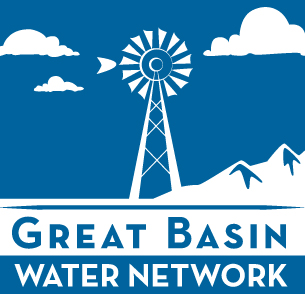FOR IMMEDIATE RELEASE
December 6, 2022
Media Contacts:
Beaver County Commissioner Mark Whitney, 435-691-9448
GBWN Board Member Steve Erickson, 801-554-9029
Former White Pine County Commissioner Gary Perea, 775-761-6128
Chairwoman Tamra Borchardt Slayton, 435-691-3946
FILING INTENDS TO SEND CEDAR CITY PIPELINE FIGHT TO STATE COURT
BEAVER, UT –– Today, the Beaver County Commission –– with support from Great Basin Water Network and other partners –– announced the intent to pursue legal action against the State of Utah and the Central Iron County Water Conservancy District (CICWCD) in state district court. Per the Utah Administrative Procedures Act, the county will send a 30-day notice to the State Engineer and CICWCD because of non-compliance with administrative orders and a 2019 settlement agreement that provisionally resolved state water rights disputes in relation to the destructive and dangerous Cedar City Pipeline, a three-phase project to export more than 27,000 acre feet of groundwater near the Utah-Nevada border.
New US Geological Survey information and other factors are forcing the county and its allies to ensure that the state protects water resources in Utah and Nevada that are now in jeopardy because of the pipeline. In the 30-day notice, the coalition calls for a state-level public process to vet CICWCD’s monitoring, management and mitigation plans and to consider new federal science demonstrating large-scale impacts that will occur should the project begin. If not, there will be claims filed in a Utah District Court.
From the time of receipt of notice, the Utah State Engineer will have 30 days to decide if an administrative action can resolve the matter before going to state district court.
“CICWCD and the state are not abiding by the administrative orders and the terms of the settlement agreement so we have to take action,” said Beaver County Commissioner Mark Whitney. “CICWCD’s monitoring, management and mitigation plans legitimize groundwater mining from Pine and Wah Wah Valleys all the way to the Great Salt Lake. The state has to decide whether it wants to protect our beloved resources or let Cedar City get away with breaking the law. The choice should be easy.”
The 30-day notice is the latest salvo in a 15-plus-year fight over the Cedar City pipeline and water grab proposal. The settlement requires a valid monitoring, management and mitigation plan in order to appropriate the water. CICWCD put forth a plan this spring that does not meet the standards under existing law, prompting the coalition to act.
CICWCD’s project, per the settlement agreement, seeks to export nearly 9 billion gallons of water annually (27,000 afy) from Pine and Wah Wah Valleys in Utah’s West Desert. Additionally, CICWCD has water rights applications for 3.25 billion gallons (10,000 afy) in Hamlin Valley.
A significant concern among the parties is the project’s impacts on tribal governments and indigenous communities. The project will siphon water from the Indian Peaks Band of the Paiute Indian Tribe of Utah. BLM, state and CICWCD officials did not properly consult or consider the federally reserved water rights held by IPB in Pine Valley.
“They are stealing our water for their project,” said Tamra Borchardt Slayton, Chairwoman of the Indian Peaks Band. “This project is in direct violation of the federal government’s trust obligations to IPB. The state of Utah cannot allow this project to move forward.”
CICWCD pumping in Pine and Wah Wah Valleys, according to the USGS, will impact an area larger than 10,000 square miles. Pine and Wah Wah Valleys are the headwaters for the Great Salt Lake Desert Interbasin Flow System and other groundwater systems that ultimately move into the Great Salt Lake. CICWCD pumping will inflict long-term impacts on the imperiled saline lake and other areas. USGS reports show that pumping in Pine and Wah Wah Valleys would drop the water table by 50 feet in Snake Valley, home to Great Basin National Park, and drain the water table by hundreds of feet in Pine and Wah Wah Valleys.
“State law and the objective USGS science – not the bought and paid for science from CICWCD – demonstrate that this project fails to meet the standards under the settlement agreement and Utah water law,” said Kyle Roerink, executive director of the Great Basin Water Network. “The water doesn’t exist, but CICWCD wants to have its cake and eat it too. Its leaders don’t want to buy out farmers, rip up turf, and implement real conservation measures. Instead they want to groundwater mine at the expense of Indigenous communities and rural counties while taking away every drop they can from the heart of the Great Basin and the Great Salt Lake.”
At the federal level, all parties involved in the project are currently waiting for the Bureau of Land Management to release the Environmental Impact Statement analyzing a right of way for the Pine Valley phase of the project. In March, Beaver, Millard, and Juab Counties, along with White Pine County, NV, submitted comments raising major questions about the feasibility of the effort.
Additionally, Great Basin Water Network led a coalition of 22 NGOs and companies like Patagonia in submitting comments on the federal environmental review –– outlining non-compliance with the law and addressing grave concerns about the project. Moreover, the Great Salt Lake Advisory Council, grazing boards and the Central Nevada Regional Water Authority also submitted comments questioning the impacts on Nevada and the Great Salt Lake.
CICWCD estimates that the project will cost $260 million. But those outdated figures were conducted before COVID and inflation. CICWCD’s own reports say that some ratepayers will see rate increases between 300 and 700 percent – in pre-inflation numbers. The cheapest option would be for CICWCD, which has some of the lowest water rates in the west, to start charging users for their wasteful practices and consider buying out agricultural lands.

